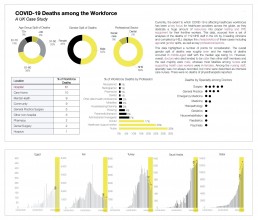Abu Dhabi Health Services Company (SEHA) is to adopt a COVID-19 impact assessment tool from Draper & Dash to better understand its capacity needs.
The tool helps healthcare providers plan resources and response strategies using local data such as pathology, radiology and live emergency department data and also pulls in Hospital Episode Statistics (HES) data and other global data sources and models.
SEHA said the modelling exercise will help plan for a comprehensive response to the rapidly evolving situation.
Dr. Gareth Goodier, Group CEO at SEHA, said to HTN “Having access to real-time data from across the world on one platform allows us to compare our current situation against other countries with a similar profile. There is an opportunity to learn from different insights and approaches, all of which further contributes to our predictive modelling efforts, and helps identify what the capacity needs to look like once the patient surge hits”.

The company said “While this pandemic has hit individuals of all ages, there are groups of patients that are highly vulnerable. By triaging patients based on risk factors and symptom severity, SEHA is in a better position to determine whether a patient requires admission to its healthcare facilities in acute care or critical care beds, or whether the patient can safely be monitored in a hotel or even from home through the government’s home isolation program. Complexity comes from managing patients in multiple sites, and balancing this with the patient surge and the bed capacity.”
.
“Sharing data that can easily be interpreted contributes to greater engagement from the administrators and front-liners who need to quickly adapt their strategies and operations as the situation changes dynamically.”
.
SEHA said one of the reasons to adopt the tool was its ability to translate large amounts of data into attractive and simple visuals, particularly to help adoption and ease of use of such information by clinicians.